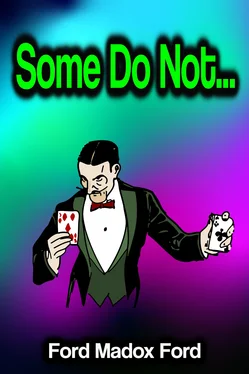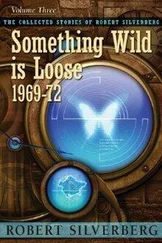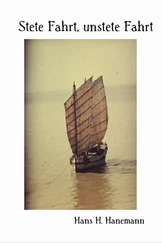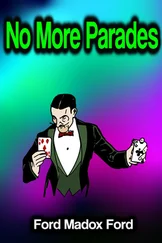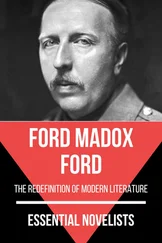Tietjens said:
'Drink up your tea quickly and let's get started.' He was drawing from his pocket a number of telegraph forms which he began arranging. The General said:
'Don't burn your mouth. We can't start off before all...all these other gentlemen. We're too slow.'
'No, we're beastly well stuck,' Sandbach said. Tietjens handed the telegraph forms to Macmaster. 'You'd better take a look at these,' he said. 'I mayn't see you again to-day after the match. You're dining up at Mountby. The General will run you up. Lady Claude will excuse me. I've got work to do.'
This was already matter for dismay for Macmaster. He was aware that Tietjens would have disliked dining up at Mountby with the Sandbachs, who would have a crowd, extremely smart but more than usually unintelligent. Tietjens called this crowd, indeed, the plague-spot of the party--meaning of Toryism. But Macmaster couldn't help thinking that a disagreeable dinner would be better for his friend than brooding in solitude in the black shadows of the huddled town. Then Tietjens said:
'I'm going to have a word with that swine!' He pointed his square chin rather rigidly before him, and looking past the two brandy drinkers, Macmaster saw one of those faces that frequent caricature made familiar and yet strange. Macmaster couldn't, at the moment, put a name to it. It must be a politician, probably a Minister. But which? His mind was already in a dreadful state. In the glimpse he had caught of the telegraph form now in his hand, he had perceived that it was addressed to Sylvia Tietjens and began with the word 'agreed.' He said swiftly:
'Has that been sent or is it only a draft?'
Tietjens said:
'That fellow is the Rt. Hon. Stephen Fenwick Waterhouse. He's chairman of the Funded Debt Commission. He's the swine who made us fake that return in the office.'
That moment was the worst Macmaster had ever known. A worse came. Tietjens said:
'I'm going to have a word with him. That's why I'm not dining at Mountby. It's a duty to the country.'
Macmaster's mind simply stopped. He was in a space, all windows. There was sunlight outside. And clouds. Pink and white. Woolly! Some ships. And two men: one dark and oily, the other rather blotchy on a blond baldness. They were talking, but their words made no impression on Macmaster. The dark, oily man said that he was not going to take Gertie to. Budapest. Not half! He winked like a nightmare. Beyond were two young men and a preposterous face...It was all so like a nightmare that the Cabinet Minister's features were distorted for Macmaster. Like an enormous mask of pantomime: shiny, with an immense nose and elongated, Chinese eyes.
Yet not unpleasant! Macmaster was a Whig by conviction, by nature, by temperament. He thought that public servants should abstain from political activity. Nevertheless, he couldn't be expected to think a Liberal Cabinet Minister ugly. On the contrary, Mr Waterhouse appeared to have a frank, humorous, kindly expression. He listened deferentially to one of his secretaries, resting his hand on the young man's shoulder, smiling a little, rather sleepily. No doubt he was overworked. And then, letting himself go in a side-shaking laugh. Putting on flesh!
What a pity! What a pity ! Macmaster was reading a string of incomprehensible words in Tietjens' heavily scored writing. Not entertain...flat not house...child remain at sister ...His eyes went backwards and forwards over the phrases. He could not connect the words without stops. The man with the oily hair said in a sickly voice that Gertie was hot stuff, but not the one for Budapest with all the Gitana girls you were telling me of! Why, he'd kept Gertie for five years now. More like the real thing! His friend's voice was like a result of indigestion. Tietjens, Sandbach and the General were stiff, like pokers.
What a pity! Macmaster thought.
He ought to have been sitting...It would have been pleasant and right to be sitting with the pleasant Minister. In the ordinary course he, Macmaster, would have been. The best golfer in the place was usually set to play with distinguished visitors, and there was next to no one in the south of England who ordinarily could beat him. He had begun at four, playing with a miniature cleek and a found shilling ball over the municipal links. Going to the poor school every morning and back to dinner; and back to school and back to bed! Over the cold, rushy, sandy links, beside the grey sea. Both shoes full of sand. The found shilling ball had lasted him three years...
Macmaster exclaimed: 'Good God.' He had just gathered from the telegram that Tietjens meant to go to Germany on Tuesday. As if at Macmaster's ejaculation, Tietjens said:
'Yes. It is unbearable. If you don't stop those swine, General, I shall.'
The General sibilated low, between his teeth:
'Wait a minute...Wait a minute...Perhaps that other fellow will.'
The man with the black oily hair said:
'If Budapest's the place for the girls you say it is, old pal, with the Turkish baths and all, we'll paint the old town red all right next month,' and he winked at Tietjens. His friend, with his head down, seemed to make internal rumblings, looking apprehensively beneath his blotched forehead at the General.
'Not,' the other continued argumentatively, 'that I don't love my old woman. She's all right. And then there's Gertie. 'Ot stuff, but the real thing. But I say a man wants...' He ejaculated, 'Oh!'
The General, his hands in his pockets, very tall, thin, red-cheeked, his white hair combed forward in a fringe, sauntered towards the other table. It was not two yards, but it seemed a long saunter. He stood right over them, they looking up, open-eyed, like schoolboys at a balloon. He said:
'I'm glad you're enjoying our links, gentlemen.'
The bald man said: 'We are! We are! First-class. A treat!'
'But,' the General said, 'it isn't wise to discuss one's...eh...domestic circumstances...at...at mess, you know, or in a golf house. People might hear.'
The gentleman with the oily hair half rose and exclaimed:
'Oo, the...' The other man mumbled: 'Shut up, Briggs.'
The General said:
'I'm the president of the club, you know. It's my duty to see that the majority of the club and its visitors are pleased. I hope you don't mind.'
The General came back to his seat. He was trembling with vexation.
'It makes one as beastly a bounder as themselves,' he said. 'But what the devil else was one to do?' The two city men had ambled hastily into the dressing-rooms; the dire silence fell. Macmaster realised that, for these Tories at least, this was really the end of the world. The last of England! He returned, with panic in his heart, to Tietjens' telegram...Tietjens was going to Germany on Tuesday. He offered to throw over the department...These were unthinkable things. You couldn't imagine them!
He began to read the telegram all over again. A shadow fell upon the flimsy sheets. The Rt. Hon. Mr Waterhouse was between the head of the table and the windows. He said:
'We're much obliged, General. It was impossible to hear ourselves speak for those obscene fellows' smut. It's fellows like that make our friends the suffragettes! That warrants them...' He added: 'Hullo! Sandbach! Enjoying your rest?'
The General said:
'I was hoping you'd take on the job of telling these fellows off.'
Mr Sandbach, his bull-dog jaw sticking out, the short black hair on his scalp appearing to rise, barked: 'Hullo, Waterslop! Enjoying your plunder?'
Mr Waterhouse, tall, slouching and untidy-haired, lifted the flaps of his coat. It was so ragged that it appeared as if straws stuck out of the elbows.
'All that the suffragettes have left of me,' he said laughingly. 'Isn't one of you fellows a genius called Tietjens?' He was looking at Macmaster. The General said:
Читать дальше
